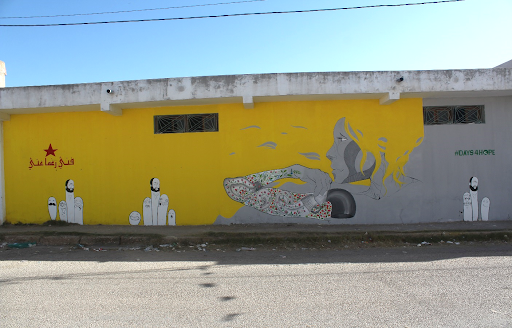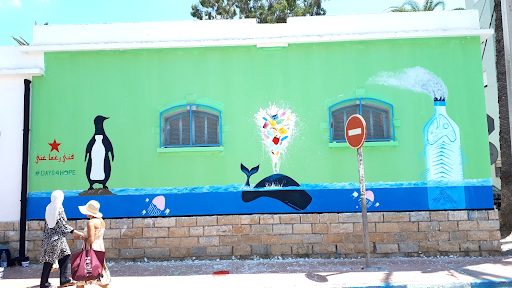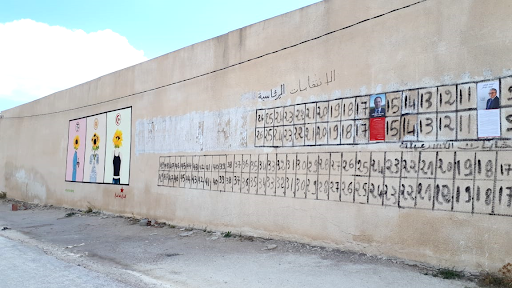Walls of Hope in Tunisia
Walls of Hope is an initiative concerned with advocating for the creation of favorable conditions for cultural development, and for peace and stability in 3 tension areas through organizing 3 public mural arts events in a collaborative participatory approach with civil society actors, young people and local community.
The initiative aligns with the core concept of Landscapes of Hope. As first, Walls of hope will bring together civil society actors across different sectors (Culture, Human rights, youth empowerment, education, and Peacebuilding) with the aim of bringing the issue of violent extremism’s raise in Tunisia to public attention using innovative grassroot approach based on public mural arts. Secondly, Walls of Hope will address directly the issues of Youth empowerment and Conflict and reconciliation.
The initiative will last 3 days, and that will take place in 3 tension areas. It consists to organize public community mural arts event in each region, based on a grassroot participatory approach with local civil society actors, local populations form different social background, and mainly young people respecting gender balance. The themes of the 3 mural arts creations will address the issue of the raise of violent extremism in Tunisia, promoting values of peacebuilding, tolerance and social cohesion. The project will create local dynamics that will enhance the social resilience, boost the collective creativity and promote access to culture in the most deprived and risky areas.
The objective of the initiative is to advocate for the creation of favorable conditions for cultural development, and for peace and stability in tension areas. The initiative will convey the image of Tunisian youth, as an active, creative and resilient youth, as it will provide opportunities for talented marginalized young people from the 3 areas to express their opinions, reflect their realities and stories using mural graffiti arts, and then to influence public speech on the prominent role of culture to advocate against violent extremism in Tunisia.
1st Mural: HER
- Date: 7-9 August 2019
- Place: Kesra- Governorate of Seliana.
- In partnership with festival El Mansoura
The mural is a picture of a woman in a middle of parasites that are blocking her development. That reflects the struggles faced by rural women, mainly the extremist social and religious mentalities and traditions that block her from liberation and from practicing her rights.

2nd Mural : CRIMINALITY
- Date: 13-15 August 2019
- Place: Ezzahra- Governorate of Ben Arous.
- In partnershipwith municipality of Ezzahra
Ezzahra once considered as a tourist area with its beautiful beach, is now suffocated with pollution. That pollution affected the health of local population; they are breathing poisons (weak immune systems, asthma…). Some even mention that this pollution is causing a resurgence of cancer in the region. That situation created a feeling of indignation among the population and increased social tensions and mistrust with the government.

3rdMural : Promo5abet
- Date: 3-4 September 2019
- Place: Souayah- Governorate of Nabeul.
- In partnershipwith association Allouen and local gypsum factory.
While the number of Tunisian fighters abroad exceeds 5000 persons, and in the framework of Tunisian presidential elections, no candidate addressed in his/her electoral program the issue of return of Tunisian fighters and any strategies of terrorism countering.
The mural was drawn in the same electoral wall, next to pictures and electoral programs of 26 presidential candidates, in aim to advocate for the necessity to include a clear vision of youth inclusion, and strategies of rehabilitation and control of returnees fighters.

Tunisia is considered as the success story, “the model”, of the Arab Spring in terms of achieving a peaceful democratic transition. However, it is still facing some challenges and gaps that threaten its stability and emerging democracy. In fact, the context of cultural desertification, social marginalization, weak economic and social development and lack of civic awareness, especially for young people, can be a source of instability, creating a sense of vulnerability that can lead to radicalization and violent extremism. Indeed, Tunisia seems to be fertile ground for the rise of violent extremism, in which young people are disproportionately among the victims or perpetrators of extremist violence. Thus, in Tunisia in 2016, 245 terrorist cells were dismantled by the Ministry of the Interior, and more than 6,000 young people joined terrorist groups, particularly in the Islamic State (IS). Tunisian authorities said that 800 fighters have returned to the country and are currently in prison and the number is likely to rise in the coming months.
In addition, we consider that the cultural desertification, the lack of access to culture, the lack of artistic channels and opportunities adapted to the skills and competences of young people in marginalized deprived areas, is linked to the development of violent extremism movement among young people, make the intervention of civil society in general and of the cultural sector in particular, more than urgent.
In this context, our initiative is concerned with advocating for the creation of favorable conditions for cultural development, and for peace and stability in 3 tension areas through organizing 3 public mural arts events in a collaborative participatory approach with civil society actors, young people and local community.
The initiative aligns with the core concept of Landscapes of Hope. As first, Walls of hope will bring together civil society actors across different sectors (Culture, Human rights, youth empowerment, education, and Peacebuilding) with the aim of bringing the issue of violent extremism’s raise in Tunisia to public attention using innovative grassroot approach based on public mural arts. Secondly, Walls of Hope will address directly the issues of Youth empowerment and Conflict and reconciliation.
This initiative will also empower marginalized youth, including women, so that they can make their voices heard in a form of alternative cultural expressions (Mural arts) spreading alternative messages of prevention of violent extremism and social cohesion among young people and local communities in their areas.
In fact, the creation of mural arts in public spaces in tensions areas is an innovative approach as a means of social inclusion and prevention of violent extremism for young people and incentive to dialogue. In addition, the initiative will contribute significantly to the creation of individual or collective social capital by building and strengthening social networks. Social capital, in the approach of many social and counterterrorism experts, is one of the most crucial variables for individual and collective resilience. (Personal interview with Susan Szmania, Senior Researcher, National Consortium for the Study of Terrorism and Response to Terrorism (START), University of Maryland, June 2017, http://www.start.umd.edu/people/susan-szmania.)
The action carries some elements with a particular added value, mainly: The promotion of gender equality and the empowerment of women (The project guarantee gender equality), the promotion of the values of citizenship, human rights and democracy, the empowerment of young people (the organization of FanniRaghmanAnni, is founded and led by young professional cultural managers. Thus, the main beneficiaries are young people), Reduce cultural decentralization and the fight against marginalization and segregation of vulnerable groups and the participatory approach in working with local organizations and other stakeholders.
